Politics
Meet five trailblazing LGBTQ candidates running to make a difference in 2022
These queer politicians are running to make a difference
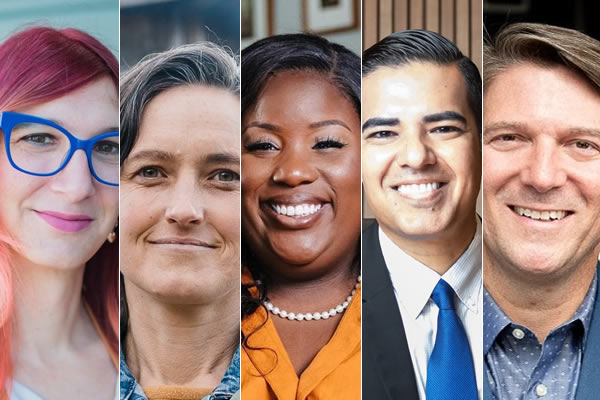
Each year, more LGBTQ candidates run and are elected to serve in local, state, and federal offices. And 2022 is shaping up to be no different.
As of the 2021 election cycle, there are more than 1,000 out LGBTQ representatives in the United States. Several LGBTQ trailblazers are running for office in 2022; here are five candidates to keep your eye on this year.
Jasmine Beach-Ferrara
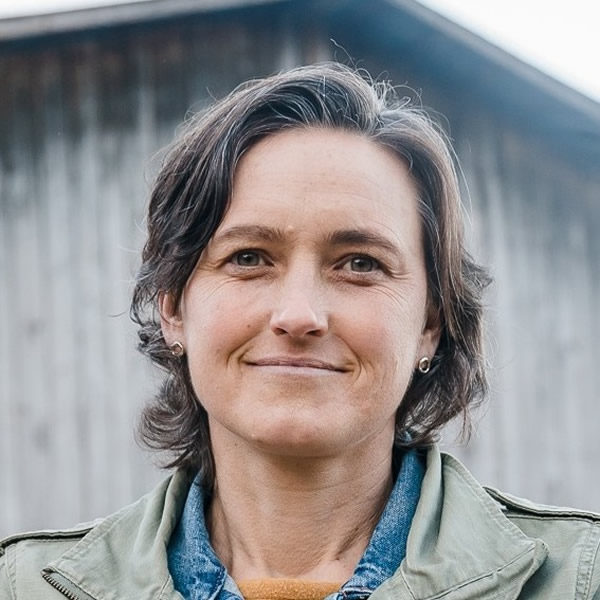
Current position: Buncombe County Commissioner
Position sought: U.S. House of Representatives, District 14
After serving as Buncombe county commissioner in North Carolina, Jasmine Beach-Ferrera is making a change and running for the U.S. House of Representatives.
Beach-Ferrara, who is a lesbian, was elected in 2016 and reelected in 2020. She is also an ordained minister in the United Church of Christ and the founding executive director of the Campaign for Southern Equality.
She said it’s been a “tremendous honor” to serve as a county commissioner. During her tenure, Beach-Ferrara has been pushing for policy focused on early childhood education and opioid epidemic response, as well as pandemic relief projects.
“Local government is such a powerful part of how government happens in our country. It’s so immediate in terms of impacting people’s lives so quickly,” she said. “Personally, I really just love having the opportunity to serve in that way and it’s been a big motivator for me in terms of why I’m now seeking to serve on the federal level.”
If elected, Beach-Ferrara wants to focus on building bridges and listening to what her constituents need, which are needed priorities that have been lost under toxic leadership in the state, she said.
While on the campaign trail, Beach-Ferrara said being out has been a big strength for her.
“The power of people running and being out is that the moment you come out, you’re communicating a few things … honesty and authenticity, and letting people know that you are showing up exactly as you are,” she said.
Robert Garcia
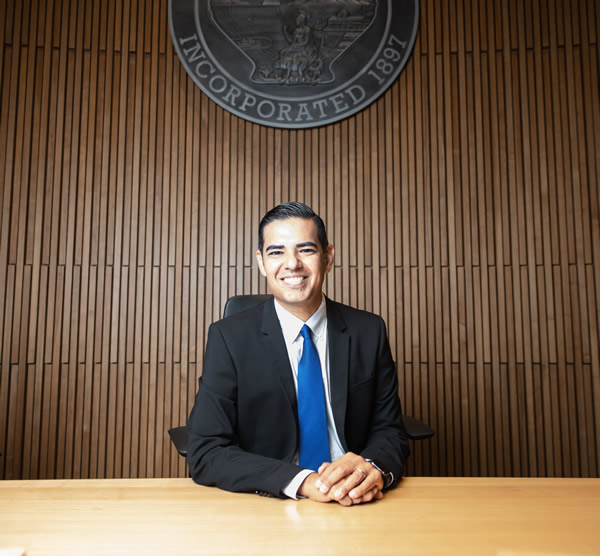
Current position: Mayor of Long Beach, Calif.
Position sought: U.S. House of Representatives, CA-42
Mayor Robert Garcia is running for the U.S. House of Representatives.
As the mayor of Long Beach, Calif., Garcia forged a national model for testing and the COVID-19 vaccination rollout. Long Beach was the first municipality to vaccinate educators in California. He is the first mayor of Long Beach to appoint a majority of women to board and commissions, as well.
Garcia, who is gay, immigrated to the United States from Peru when he was five years old. Becoming a citizen was “the best thing that ever happened” to him, he said. Now, he is running for Congress to help give people the same opportunities given to him.
“Patriotism is about helping people. It’s about taking care of your neighbor. It’s about standing up for the values that made this country and that includes supporting kids like me who are immigrants,” Garcia said.
If elected, Garcia wants to focus on building infrastructure as he has as mayor, expand LGBTQ rights and provide pathways to citizenship for folks that are undocumented.
“I understand the immigration system because I went through it,” Garcia said. “I know how people struggle and how folks navigate a complex and burdensome system.”
Michele Rayner-Goolsby
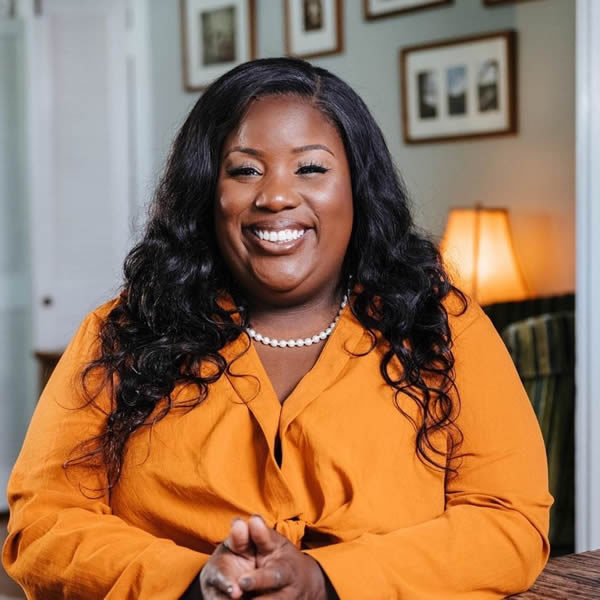
Current position: Florida House of Representatives, District 70
Position sought: U.S. House of Representatives, FL-13
Former Civil Rights Attorney Michele Rayner-Goolsby wants to bring a fresh perspective to Congress.
Currently serving as the first out queer Black representative in the Florida Legislature, her priority is advocating for her constituents.
“People are hungry for a different type of leadership — that is rooted in community, that is rooted in transparency, that is rooted in accountability,” she said.
Rayner-Goolsby’s experience as a Black queer woman is her “best strength,” she said.
“I’ve had to fight and earn everything that I have ever had in my life,” she said. That shapes the way I think about policy and legislation.”
As a statehouse representative, Rayner-Goolsby has spearheaded COVID-19 vaccine pop-up distribution sites and passed legislation like an urban agriculture bill to bring community gardens to food deserts and a workforce development bill that establishes an apprenticeship approach to becoming a certified nursing assistant.
If elected, Rayner-Goolsby wants to build legislation that outlasts her tenure, she said. She wants to pass comprehensive voting rights legislation, environmental justice protections and address the affordable housing crisis.
“We have got to come up with creative solutions,” she said. “And we’ve got to have the political will to figure it out. It’s not the lack of resources, it’s the lack of political will.”
Brianna Titone

Current position: Colorado House of Representatives, District 27
Position sought: Colorado House of Representatives, District 27
Brianna Titone, an incumbent in the Colorado Legislature, is seeking reelection after serving District 27 for two terms.
Titone is the first transgender person to be elected to the Colorado Statehouse.
After seeing three trans people win elections in 2017, Titone was inspired to run for the statehouse seat. Her background as a geologist and personal identity combined to give her a unique and powerful skillset.
“As a scientist, I’m able to understand and look at the data,” Titone said. “And as a trans person, I know how to be empathetic to people’s issues and problems.”
One of her biggest accomplishments was bringing back and passing the bill banning the “Gay and Trans Panic Defense” after the legislation was nearly killed.
“I pleaded with the Senate and the House leadership to get that bill back on the schedule. And we were able to do it,” she said. “I wasn’t going to let that issue have to wait another year to be passed.”
Titone has been on the frontlines in pushing against efforts to remove trans kids from sports, as well.
“I’m a big advocate for communities coming together,” Titone said. “And sports is a great way for people to come together and rally around the people in their community. When we leave kids out or we force kids out of that kind of activity, we’re really undermining community.”
Todd Delmay

Current position: Entrepreneur
Position sought: Florida State House of Representatives, District 100
Todd Delmay, a father, husband, and entrepreneur, has been on the frontlines of LGBTQ advocacy for years.
Delmay, who is gay, adopted his son with his partner in 2010 when it was still illegal in Florida. Delmay’s husband adopted their son Blake as a single parent, and Delmay was told to bring friends and “blend in the background” to not arouse suspicion. Later that year the law was overturned and Delmay adopted Blake as a second parent, but the process was humiliating and upsetting, he said.
In 2014, Delmay and his partner were one of the couples that sued for the right to marry in Florida. In 2015, Delmay and his husband were one of the first gay couples to marry in the state.
“That was a pretty empowering moment,” Delmay said.
Delmay is excited to bring his unique perspective as a gay parent to the statehouse, he said. Adoption rights, for example, is an issue Delmay can speak to personally.
“When LGBTQ people are in the room, it changes the conversation,” Delmay said.
Delmay is the CEO of Delmay Corporation, an event technology and software company. If elected, Delmay hopes to support small businesses, pass legislation concerning the environment and fight for civil rights.
“It’s important that the legislature always reflect the people because there are so many different perspectives,” Delmay said. “And if we have any hopes of turning the state blue, we need to make sure that we are speaking to everyone and that the legislature represents everyone.”
Political commentary & analysis
The impact of the Supreme Court’s Idaho ruling on trans people
The ruling is complicated & will have an immediate impact for trans youth in Idaho and could have national repercussions

By Erin Reed | WASHINGTON – On Monday, news broke that the Supreme Court of the United States will allow Idaho to enforce its ban on gender-affirming care for transgender youth, a felony ban that makes trans care punishable by up to 10 years in prison for doctors who provide it to those under 18.
The ruling was not based on the merits of gender-affirming care or its constitutionality; rather, it addressed broad injunctions and a lower court’s ability to block a law fully at the earliest stages — a pet issue for some conservative justices who chose to take decisive action when transgender lives were at stake.
The immediate impact of the ruling is clear: transgender individuals will be barred from obtaining gender-affirming care in Idaho, except for only two plaintiffs, despite no rationale for how a ban is supposed to work for everyone but those two plaintiffs when doctors are broadly barred from providing care. In other states where anti-trans laws are being litigated, the impacts are more nebulous, and the ruling could impact many other issues as well.
The case in question stems from a challenge to Idaho’s felony ban on gender-affirming care. In December 2023, a federal judge ruled that the ban was likely unconstitutional, ruling in favor of two transgender minor plaintiffs using pseudonyms.
The judge stated that the right to obtain medically necessary care for your children is “deeply rooted in this nation’s history and traditions,” using the logic from the anti-abortion Dobbs decision against transgender care bans as an apparent preemptive strike at such language being utilized to justify bans on trans care should the case ever reach the Supreme Court.
The judge then issued a broad preliminary injunction that prevented the state from enforcing the law on anyone while the court process played out.
It was the breadth of the injunction that came under dispute in the Supreme Court, not issues directly related to the constitutionality of transgender care. Attorneys for the state of Idaho argued that the injunction was too broad and that the state should be allowed to enforce the law on everyone except for the plaintiffs.
This would force anyone seeking care to seek individual exceptions and rulings from federal courts, an expensive endeavor. On the other hand, attorneys for the plaintiffs pointed out that the broad injunction was necessary: the plaintiffs were using pseudonyms to preserve their anonymity.
Without a broad preliminary injunction, doctors would be unlikely to continue offering care, thus making it impossible for the plaintiffs to access that care even with a ruling in their favor, and in doing so, they would have to forfeit their anonymity.
The majority of the court sided with reversing the injunction and allowing the law to go into effect for everyone but the plaintiffs, with a plurality signing onto Justice Gorsuch’s opinion stating that the ability of judges to issue broad preliminary injunctions should be muted.
They had little to say about the constitutionality of the law itself, except for Justices Kavanaugh and Barrett, who wrote in their separate concurrence that they believe the state may a likelihood of success on the merits [Update: Law Dork’s Chris Geidner states that the “merits” here, as Kavanaugh described it in his opinion, are about the scope of the injunction, and so it may not necessarily signal Kavanaugh and Barrett’s votes on the challenges to the gender-affirming care bans].
Instead, the real impact of this case will likely be on justices issuing broad preliminary injunctions to block statewide laws in the early stages of a constitutional challenge; it should not immediately impact any anti-trans laws being decided on the merits.
Of course, this provides little consolation to transgender young people in Idaho, who will have to go without access to their medication in the state even though two courts have ruled that the law blocking them is likely unconstitutional. It also raises questions about other broad preliminary injunctions nationwide on transgender topics: we likely cannot expect each student to take their school to federal court every time they want to challenge an individual bathroom ban in their local high school, for instance.
These questions have a significant impact on transgender individuals but will not only affect transgender people. They will arise anytime a state passes a law that is broadly enjoined at the preliminary stage by lower courts. This issue has surfaced in many other cases, from ghost guns to the mifepristone case, where sometimes broad preliminary injunctions are viewed favorably by the same justices who just ruled negatively on them for transgender individuals.
The impact of the ruling will likely be initially muted for transgender people nationwide. While it will have a significant impact in Idaho, there are no cases currently pending on transgender healthcare where a broad federal preliminary injunction is in place, other than in Idaho.
The case in Arkansas, for instance, has moved well beyond the preliminary injunction stage and has been ruled unconstitutional on the merits. However, numerous other cases are still being litigated, and states are enjoined on a wide range of topics, many of which have been broadly enjoined while awaiting a final constitutional ruling on the law. It remains to be seen if any of these broad injunctions are similarly challenged.
It is also important to note that this will not impact any rulings made under state-level litigation. For instance, in Montana, a ban on gender-affirming care is enjoined from enforcement using the state constitution’s right to seek “safety, health, and happiness in all lawful ways,” as well as an explicit right to privacy.
Meanwhile, in Ohio, a state challenge is currently underway using a provision in the state constitution that bars the state from issuing penalties for obtaining or providing healthcare. These state challenges will be insulated from anything that happens at the Supreme Court level.
Still, the ruling will mean further hardship for transgender youth in Idaho, and could signal that the Supreme Court is willing to take drastic action when it comes to transgender healthcare, even if that action is not directly related to the merits of the healthcare bans themselves. The Supreme Court could address the issue on the merits at any time, and it seems increasingly likely that it will in the near future.
****************************************************************************

Erin Reed is a transgender woman (she/her pronouns) and researcher who tracks anti-LGBTQ+ legislation around the world and helps people become better advocates for their queer family, friends, colleagues, and community. Reed also is a social media consultant and public speaker.
******************************************************************************************
The preceding article was first published at Erin In The Morning and is republished with permission.
Political commentary & analysis
The Cass Review heralds how all trans medicine will die
In effect, the study research completely blew off the input of the people most affected by access to treatment
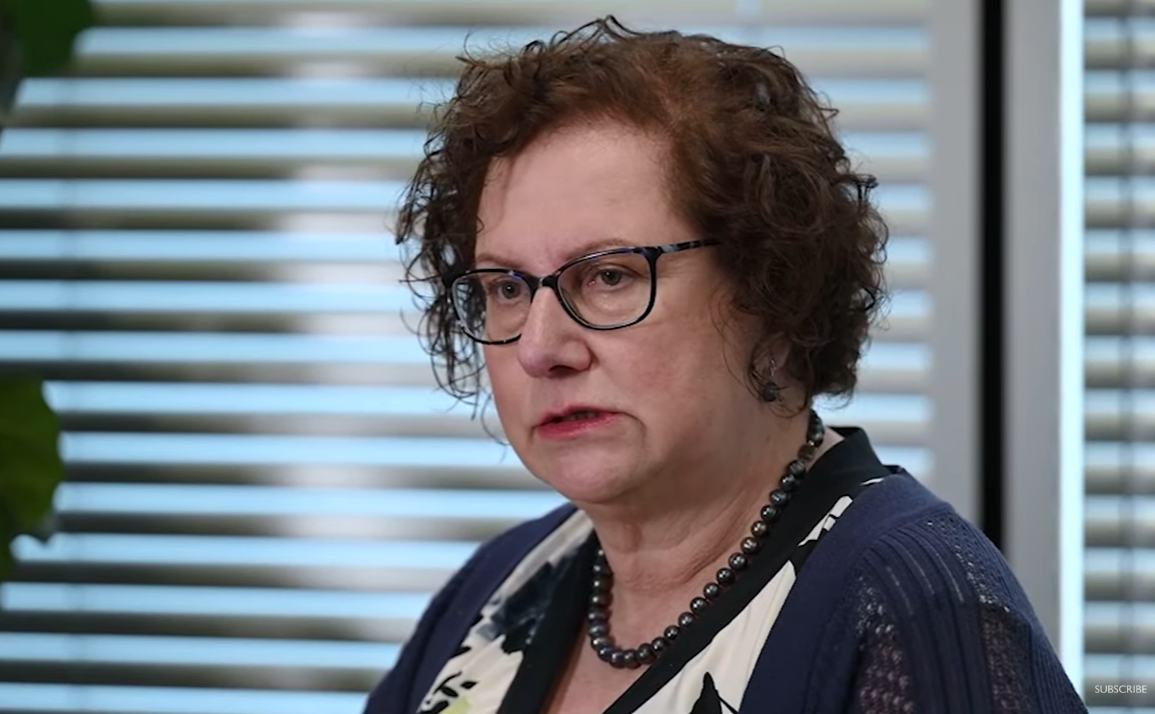
By Brynn Tannehill | FAIRFAX, Va. – This past week, the Cass literature review for the UK’s National Health Service for transgender youth was completed after four years in development. Although touted as independent, it was anything but. Dr. Hillary Cass consulted with far-right religious anti-trans activists like Patrick Hunter, and took cues on how to ban trans health care from Florida’s rigged process.
The results were predictable: it effectively recommends banning transition related care for anyone under the age of 25. Because of backlogs in the NHS system, this means that transgender people cannot even begin applying for care until they are 25 and will likely have to wait until they are 35, even if they have had a transgender identity since an early age. It also recommends a ban on social transitions, and any sort of social affirmation.
It arrived at these conclusions by disregarding any studies deemed “low quality”—that is, any study that wasn’t a randomized control trial and wasn’t double-blinded. This sets an impossible standard: you cannot double-blind a study where both the patient and the doctor will notice the physiological changes that come with taking the drug (or getting the surgery). The Cass review also failed to include their own findings that none of the patients reviewed were unhappy with the treatments, and only 8 detransitioned.
In effect, they completely blew off the input of the people most affected by access to treatment.
It’s also very difficult to get an randomized control trial study approved for youth, if the available evidence says a lack of treatment is likely to increase the risk of suicide. No IRB will sign off on something that is likely to turn into an LD50 study (kills half (50%) of the test subjects exposed to it).
Using this method, the Cass review was able to exclude well over a hundred studies on transgender youth health care and declare that there was no evidence supporting affirming care. It then recommended a “treatment” for which there is no evidence (talk therapy for 20 years, and hoping it goes away before the patient unalives themselves).
Sound like conversion therapy? Yes, that’s basically what it is. Hard stop.
You might think, “Oh, this is just the United Kingdom,” and that it doesn’t affect you. But it does. We have concrete evidence that Cass was coordinating with Ron DeSantis appointees, who in turn were selected for their religious fervor and connections with anti-LGBTQ+ hate groups in the US like the Alliance Defending Freedom. The Cass review illustrates how they are planning to end access to transgender health care for all adults in the US.
Basically, the process is to get a decision-making body (like the FDA) to commission a “review” of the evidence for health care for trans adults. The reviewers will be people who already know the outcome they want and who are only interested in p-hacking their way to a non-conclusion. The formula looks like this:
- Do a lit review.
- Find filters that excludes all of the evidence in support of health care for trans people (i.e. requiring RCT and double-blind for inclusion).
- Declare that there is no evidence for transition related care.
- Recommend “neutral” interventions like talk therapy, when there’s no evidence this works.
- The FDA or state medical boards use the phony lit review to justify bans on the use of any off-label treatments for gender dysphoria, along with any gender confirmation surgeries.
With the death of Roe v. Wade, this is entirely legal. SCOTUS won’t stop it; they’re likely to uphold the decision-making authority of supposedly neutral medical authorities, and the lit reviews commissioned by them. If Trump is elected, this will happen nation-wide. If he isn’t, we’re going to see roughly 25 states eventually ban health care for trans adults the way they did to trans youth.
The mass migration of trans people will become a stampede. They will flee either to blue states or seek asylum elsewhere. Transgender people will go back to the bad old days of self-medication, buying drugs from Vanuatu, and back-alley orchiectomies. The trans community won’t disappear merely because of this, but it’s part of the overall plan to “eradicate transgenderism” in the United States. Between banning access to care, making it a crime to appear in public dressed in accordance with your gender identity, mandating conversion therapy, de-recognizing transgender people and invalidating their IDs, kicking them out of the military, revoking their clearances, segregating them from the population by banning them from public places, and Trump promising internment camps capable of “processing” millions of people (including political enemies), the strategy for how the trans community in the US could be disappeared like it’s 1942 is coming into extremely sharp focus.
It won’t happen all at once. But the Cass review shows us how they plan on justifying the initial rules and regulations with the goal of making trans people flee, because most of the tuned-in trans will see the writing on the wall. The Cass review fulfills the same role as race science: it’s meant to justify the horrors that come next.
*******************************************************************
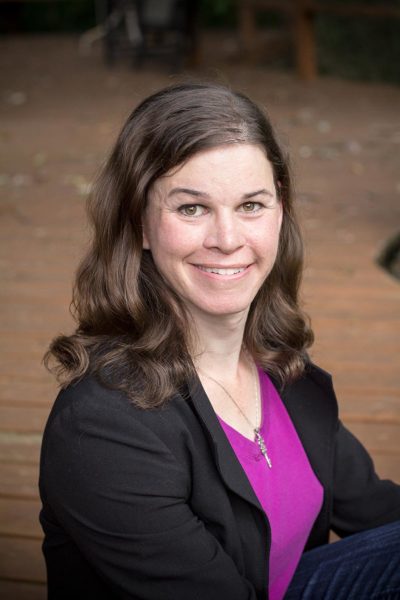
Political commentary & analysis
EU elections, empowering queer women & need for safe spaces
It’s not only a matter of choice to preserve; it is a commitment to a world where everyone has the right to be safe, heard & celebrated

By Amber Laenen | WASHINGTON – As the European Union anticipates the upcoming elections in June, a disconcerting wave of transphobic rhetoric has swept across the continent, notably in 21 EU member states, according to a recent report by ILGA-Europe.
The 13th Annual Review of the Human Rights Situation of LGBTQ People in Europe and Central Asia stresses the alarming rise in hate speech targeting the LGBTQ and intersex community. This growth in negativity — which particularly is directed at transgender people — raises profound concerns about the state of inclusivity, human rights and democracy within the EU.
The alarming surge of transphobia in European politics
According to the report, there is a trend of hate speech coming from politicians across 32 European countries of which 21 being EU member states. Painting a stark picture of the challenges faced by the LGBTQ community. In a staggering list that includes Austria, Germany, Spain and others, politicians have increasingly weaponized anti-trans rhetoric. Exploiting children is a tactic often used as part of scare strategies to create opposition to trans minors’ access to healthcare and educational facilities, extending this divisive approach to a broader trend where politicians argue that restricting information about LGBTQ people is a necessity to protect minors.

The rise in transphobic rhetoric is not only confined to politics but it has other tangible consequences. The report highlights a concerning escalation in suicide rates and mental health issues, particularly in LGBTQ youth. Violent protests outside schools and libraries have created unsafe environments, adding to the growing list of challenges faced by the community.
The far-reaching impact of demonization by politicians and the introduction of restrictive legislation underscores the need for urgent action. Hate speech is not merely an affront to people’s rights, it is an assault on the very core values upon which the EU was founded. As ILGA-Europe Advocacy Director Katrin Hugendubel notes, human rights, especially those of LGBTQ people, are facing a significant challenge from far-right forces. The exploitation of LGBTQ rights to undermine democracy, human rights and the rule of law highlights the divisive nature of the current political landscape.
As ILGA-Europe prepares to launch the “Come Out 4 Europe” campaign in response to these alarming trends, the need for visible and supportive queer female spaces is more apparent than ever. The campaign, seeking commitments from European Parliament candidates to protect the rights of LGBTQ people, underscores the urgency of safeguarding human rights, democracy and freedom.
The crucial role of queer women in European elections
Belgium, amid this backdrop of rising transphobia, is preparing for the European elections on June 9, 2024. The importance of this electoral process cannot be overstated, especially for queer women. With citizens aged 16 and above casting their votes to elect 22 members of the European Parliament (MEPs), it’s a pivotal moment for the LGBTQ community.
The voting process in Belgium follows EU law, utilizing a proportional representation system. Voters choose one party, either by marking the box above the party list or selecting individual candidates on the list. The total ballot forms for each party determine seat distribution, and preferential votes then decide which candidates secure a seat in the European Parliament.
Educated voting in the European elections is essential to queer women and the importance cannot be stressed enough. Throughout history they have faced unique battles, but this community holds the power to shape policies that directly influence their lives. By engaging in the democratic process, queer women can actively challenge the current surge in hate speech towards trans people by voting for electing representatives who actively advocate for LGBTQ rights.
Representation is more than a mere buzzword. It matters. Understanding candidates’ positions on LGBTQ issues is key and requires educating oneself on candidates’ stances as to allow queer women to vote for representatives who genuinely champion LGBTQ rights. A diverse and inclusive representation ensures that the concerns and voices of the queer community are not just heard but which are acted upon. Decisions within the European Parliament influence policies ranging from anti-discrimination laws to access to healthcare. An informed vote makes sure that legislation promotes equality, acceptance and the protection of LGBTQ rights.
By being educated on the European elections and its candidates, queer women embark on a journey of self-empowerment. By supporting candidates who prioritize inclusive curricula, they contribute to addressing LGBTQ history, health and rights, encouraging a more accepting future.
The undeniable need for physical queer women spaces
Since the European elections are nearing, the importance of physical spaces for queer women to gather and discuss voting and the candidates becomes increasingly evident. While online spaces offer the chance to connect and discuss, they come with their own unique challenges, including the spread of misinformation and miscommunication. In navigating the democratic landscape, the value of in-person gatherings for education and discussion cannot be stressed enough.
The world is saturated with digital information, and misinformation can easily infiltrate online spaces. Physical gatherings allow for a more controlled environment with direct feedback from peers, where queer women can share accurate and reliable information, ensuring a more nuanced understanding of candidates, policies and the electoral process.
In the lead-up to the European elections, we have to recognize that physical spaces for queer women are crucial. They do not only combat misinformation, disinformation and miscommunication but also serve as a vital space for shared learning. In-person gatherings create the foundation for an informed and engaged electorate, promoting a collective voice that resonates in the democratic process. The power of change lies not just in our votes but in the shared wisdom and unity forged in the physical spaces we create together.
The plight of the Crazy Circle and the call for investment in queer women spaces
After the closing of Brussels’ iconic Crazy Circle, a feminist queer space that has served as a safe haven for the LGBTQ community, it becomes increasingly evident that the struggle for queer women-only spaces in Belgium is a critical issue demanding our attention.
For the past five years, Crazy Circle has been a testament to the resilience of the LGBTQ community, creating a safe and celebratory space for queer women and their allies. However, its closure after the previous management leaving for unknown reasons and current fundraising attempt by the new owners to reopen highlight the challenges faced by such spaces in Belgium. These establishments play a vital role not only as social hubs but as catalysts for education, empowerment and advocacy. Fortunately for the new owners they recently reached their fundraising goals and raised over 50,000 euros to reopen Crazy Circle.
The loss of a space like this underscores the broader struggle faced by queer women-only spaces in Belgium. Beyond being social hubs, these spaces are vital agents of change, providing a haven for education, empowerment and advocacy. We must recognize that our commitment to the LGBTQ community extends beyond words.
The “Come Out 4 Europe” campaign by ILGA-Europe serves as a proactive response to the alarming trends in hate speech. It calls for clear political commitments on safeguarding human rights, democracy and freedom from candidates in the upcoming European Parliament elections in June. Belgium, with its own elections on the horizon, stands at a crossroads where the choices made will resonate far beyond its borders.
If we want to inform queer females about campaigns like “Come Out 4 Europe” we need spaces like the Crazy Circle. Its closure is a stark reminder of the fragility of these vital spaces. It’s a call to action, urging us to invest more in preserving and expanding queer women-only spaces. The struggle faced by Crazy Circle is not an isolated incident; it reflects a broader challenge that demands a collective response all over the world.
By fighting to preserve and expand queer women-only spaces, we are not merely safeguarding physical venues. We are investing in the education, empowerment and advocacy of the LGBTQ community. These spaces are not mere bars or gathering spots; they are crucial agents of change and empowerment.
Building a future of inclusivity
As we see what happened to Crazy Circle in Belgium, let us use this moment as a catalyst for change. It is time to rally together behind existing queer women spaces, ensuring their survival and actively working towards expanding and creating new ones. By doing so we empower individuals to educate, advocate, and, most importantly, vote for a future where safety, equality and acceptance prevail for all members of the LGBTQ community. It’s not only a matter of choice to preserve these spaces; it is a commitment to a world where everyone has the right to be safe, heard and celebrated.
In navigating the complex tapestry of the European elections, the empowerment of queer women spaces through informed voting and the preservation of physical queer women spaces become integral threads. As we stand on the precipice of change, our choices today will shape the inclusive and accepting future we envision. Together, let us weave a tapestry that celebrates diversity, protects human rights and builds a future where every voice, especially those of queer women, is not just heard but cherished.
**************************************************************************************

Amber Laenen is a senior at Thomas More Mechelen University in Belgium. She is majoring in journalism and international relations. Amber is interning with the Blade this semester as part of a continued partnership with the Washington Center.
Political commentary & analysis
Jimmy Kimmel Live’s hilarious faux ‘Out for Biden’ campaign ad
“It’s called ‘Out for Biden-Harris,’ which is a clunky title, but was definitely better than the original slogan: ‘I’m a Joemosexual”

HOLLYWOOD, Calif. – During his opening monologue Thursday, ABC Television late night host Jimmy Kimmel took playful aim at a new push by the Biden-Harris reelection campaign’s effort to get more LGBTQ+ voters to the polls in November.
The Biden-Harris campaign on Wednesday debuted “Out for Biden-Harris,” a “national organizing and engagement program to mobilize LGBTQ+ voters, communities, and leaders across the country.”
In a press release announcement, the campaign stated: “From drag queens to elected leaders to LGBTQ+ faith leaders, Team Biden-Harris will use a wide range of validators to communicate what’s at stake for the LGBTQ+ community in this election and why it’s critical that we vote for Joe Biden and Kamala Harris.”
In his satirical take on the announcement Kimmel noted:
“Yesterday they launched a new program to engage voters in the LGBTQ+ community,” Kimmel said, having a slight issue with articulating the acronym for the community. “It’s called ‘Out for Biden-Harris,’ which is a clunky title, but was definitely better than the original slogan: ‘I’m a Joemosexual.”
The parody campaign advertisement voiced by a Biden impersonator said:
“What’s up bitches? It’s me, Joe Biden, and I’m excited to announce the launch of Out for Biden-Harris: a new campaign all about you LGBT-cuties out there,” he said. “Listen, I may be straighter than a bamboo fishing rod, but I’m the most gay-friendly president in history. Like your mother used to always say, ‘You can’t spell Biden without Bi.’ And that’s the tea.”
The campaign noted that LGBTQ voters will be “a key part” of its coalition, while 39 percent of voters consider LGBTQ equality a “make-or-break issue.”
“In 2020, nearly 11,000 LGBTQ+ volunteers mobilized to help elect President Biden and Vice President Harris,” the campaign wrote. “This year, Out for Biden-Harris will re-engage these supporters and build on their work. The program is designed around the idea that there is no better messenger to mobilize LGBTQ+ voters than their friends and neighbors to bring new supporters into our campaign.”
The Biden-Harris administration is the most pro-LGBTQ in history, and LGBTQ groups with a combined 3.8 million members have endorsed President Joe Biden’s reelection campaign the Biden-Harris campaign manager Julie Chavez-Rodriguez pointed out.
“LGBTQ+ voters are a force to be reckoned with. They were critical to our victory in 2020, and they will be critical to winning again this November,” said Chavez-Rodriguez. “That’s why we’re thrilled to launch Out for Biden-Harris, which will harness the LGBTQ+ community’s organizing prowess to reelect President Biden and Vice President Harris this November.”
Watch
The Biden-Harris segment begins at the 7:22 minute mark:
Politics
First Lady warns Trump is ‘dangerous to the LGBTQ community’
Delivering a keynote address at the HRC’s ‘Equality in Action’ event, she warned Trump is “a bully” who’s “dangerous to the LGBTQ community”
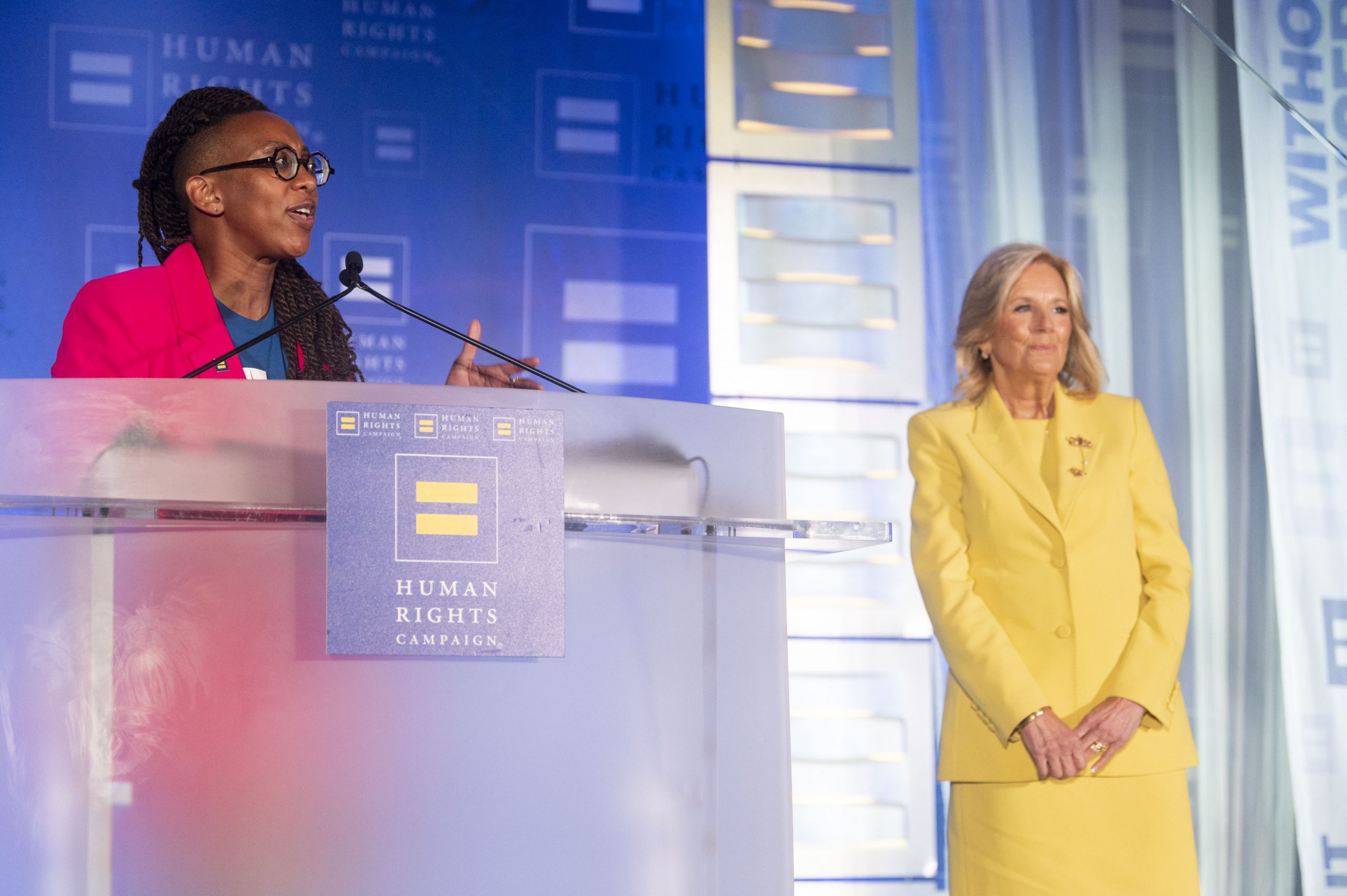
ARLINGTON, Va. — Delivering a keynote address at the Human Rights Campaign’s ‘Equality in Action’ event Friday, First Lady Jill Biden warned former President Donald Trump is “a bully” who is “dangerous to the LGBTQ community.”
Her appearance at the three-day volunteer and board gathering at the Sheraton Pentagon City in Arlington, Virginia comes as part of the Biden-Harris reelection campaign’s “Out for Biden” program, which aims to “mobilize LGBTQ+ voters, communities, and leaders across the country.”
“Today, this community is under attack,” Mrs. Biden said. “Rights are being stripped away. freedoms are eroding. More and more state laws are being passed targeting this community. Just last month, we had to fend off more than 50 anti gay amendments that Republicans tried to force into the government funding bill.”
“These were extreme measures aimed directly at this community — measures that would have limited health care and weakened protections for same sex couples,” she said. “And they served only one purpose to spread hate and fear.”
In a nod to her long career as an educator, Mrs. Biden said, “History teaches us that our rights and freedoms don’t disappear overnight. They disappear slowly. Subtly. Silently.”
She continued, “A book ban. A court decision. A ‘Don’t Say Gay’ law. One group of people loses their rights and then another. And another. Until one day you wake up and no longer live in a democracy…This is our chapter of history and it’s up to us how it ends.”
Mrs. Biden then highlighted some of the advancements for LGBTQ rights secured under the Biden-Harris administration.
“Thanks to President Biden, marriage equality is now the law of the land,” she said. “He ended the ban on gay and bisexual men donating blood. He’s made it possible for trans Americans to serve openly and honorably in our military. And he’s standing firmly against conversion therapy.”
“Yes, there are forces outside these walls that are trying to erase these hard fought gains, trying to unwind all the progress that we’ve made,” Mrs. Biden said. “They want to take our victories away. But we won’t let them. Your President will not let them — I will not let them.”
Political commentary & analysis
Transphobic report by UK pediatrician Hilary Cass released
The report calls for restrictions on trans care, social transition including trans adults up to 25 from adult trans healthcare in Britain

By Erin Reed | LONDON, UK – On Tuesday evening, Dr. Hilary Cass released a final report commissioned by the British/UK National Health Service (NHS), widely expected to target gender-affirming care. The report met these expectations, calling for restrictions on gender-affirming care and social transition, and even advocated for blocking transgender adults under the age of 25 from entering adult care.
To justify these recommendations, the review dismissed over 100 studies on the efficacy of transgender care as not suitably high quality, applying standards that are unattainable and not required of most other pediatric medicine.
Conducted in a manner similar to the anti-trans review by the DeSantis-handpicked Board of Medicine in Florida, which Cass reportedly collaborated on, the report and its reviews are likely to underpin further crackdowns on trans care globally.
The 388-page report featured 32 recommendations on how transgender care should be conducted within NHS England. It incorrectly claims that there is “no good evidence” supporting transgender care and calls for restrictions on trans care for individuals under the age of 18, although it does not advocate for an outright ban.
The report endorses the idea that being transgender may be caused by anxiety, depression, and OCD issues, despite the American Psychological Association, the largest psychological association in the world, rebutting this as lacking evidence.
It also claims that transgender individuals can be “influenced” into being trans, a nod to the discredited theory of social contagion and rapid onset gender dysphoria, rejected by over 60 mental health organizations.
Lastly, it seemingly endorses restrictions on transgender people under the age of 25, stating that they should not be allowed to progress into adult care clinics.
To support these recommendations, the report was released alongside “reviews” of the evidence surrounding transgender care, using these reviews to assert that there is “no good evidence” for gender-affirming care.
A closer inspection of the reviews released alongside the Cass report reveals that 101 out of 103 studies on gender-affirming care were dismissed for not being of “sufficiently high quality,” based on the Newcastle-Ottawa Scale—a subjective scale criticized for its flaws and potential unreliability due to a high risk of bias.
This critique is particularly significant given the contentious political nature of the subject and connections between reviewers, Cass, and anti-trans organizations.
The Cass Review seems to have emulated the Florida Review, which employed a similar method to justify bans on trans care in the state—a process criticized as politically motivated by the Human Rights Campaign.
Notably, Hilary Cass met with Patrick Hunter, a member of the anti-trans Catholic Medical Association who played a significant role in the development of the Florida Review and Standards of Care under Republican Governor Ron DeSantis.
Patrick Hunter was chosen specifically by the governor, who has exhibited fierce opposition towards LGBTQ+ and especially transgender people, and then immediately got to work on targeting transgender care. The Florida review was purportedly designed and manipulated with the intention of having “care effectively banned” from the outset, as revealed by court documents.
The Florida Review was slammed by Yale Researchers as “not a serious scientific analysis, but rather, a document crafted to serve a political agenda,” and much of their full critique is applicable to the Cass Review as well.
In those meetings, Cass apparently took interest in Florida’s anti-trans expert report, according to emails from trial exhibits uncovered by transgender researcher Zinnia Jones, such as this email confirming that a meeting took place:
Paul,
See attached information sent to me from the Cass Review. I forgot to mention that they were very interested in the Florida evidence review, especially the report from McMaster University. She recognized the work done at that institution under the leadership of Gordon Guyatt. At Dr. Cass’s request, I sent them a copy of the Florida evidence review.
Notably, Patrick Hunter has been identified as part of a network of anti-trans experts who seek to roll back gains for queer and trans rights by the Southern Poverty Law Center, and both the Florida Review and the Cass Review serve those functions.
One of the most controversial sections of the Cass Review addresses social transition, with the review recommending that individuals considering social transition “be seen as early as possible” by clinical professionals. It claims that social transition could “change the outcome of gender identity development,” a statement that notably lacks the validation or evidence level that the review demands of transgender care.
Significantly, there has been discussion about prohibiting social transition in schools, even with parental consent. A recent bill proposed by former Prime Minister Liz Truss would have prevented public officials from using language or treating a child “in a manner inconsistent with their sex,” leaving unclear how individuals should be treated differently based on their sex.
The Cass Review also touches on gendered toys, suggesting that preferences like trucks for boys and dolls for girls might have a biological basis, despite significant controversy over such claims, with a recent study casting doubt on earlier monkey studies used to justify biological differences in toy preferences.
“A common assumption is that toy choice and other gender role behaviours are solely a result of social influences; for example, that boys will only be given trucks and girls will only be given dolls to play with. Although this is partially true, there is evidence for prenatal and postnatal hormonal influence on these behaviours,” writes Cass in the report.
To support arguments around potentially high detransition/desistance rates, Cass repeatedly cites Ken Zucker, including the often-challenged “85%” rate from his research. Notably, Zucker has recommended that parents withhold “wrongly-gendered” toys from their children as a strategy to change their gender identity.
Of special note is the focus on those from ages 17-25. The Cass review states that transgender people should not be transferred into adult care until age 25. Among its rationale for doing so is that those who have been waiting for youth care, with waitlists often being over 5 years long, have that waiting time counted towards the wait for adult services.
Instead, the review proposes a “follow through” service, declaring transgender 17-25 year old’s as “vulnerable.” It is uncertain what level of restrictions this follow through service would have.
Within a day of the publication of the Cass Review, it appears that those concerns were well warranted. NHS England announced that it would be launching a review into “the operation and delivery of adult GDCs” in a report released by The Guardian.
The decision to launch a review into adult care was justified by “concerns put to the [Cass] review team by current and former staff working in the adult gender clinics about clinical practice, particularly in regard to individuals with complex co-presentations and undiagnosed conditions.”
Immediately after the release of the Cass Review, experts in transgender healthcare from around the world voiced their opposition to its findings. Dr. Portia Predny, Vice President of the Australian Professional Association for Trans Health, criticized the findings and recommendations as “at odds with the current evidence base, expert consensus, and the majority of clinical guidelines worldwide.”
Similarly, a statement from the Professional Association for Transgender Health Aotearoa condemned the review, noting, “The Review commissioned several systematic reviews into gender-affirming care by the University of York, but appears to have ignored a significant number of studies demonstrating the benefits of gender-affirming care. In one review, 101 out of 103 studies were dismissed.”
It is important to note that gender affirming care saves lives, and there is plenty of evidence to show for it. Numerous studies have demonstrated that gender-affirming care significantly reduces suicidality, with some showing a decrease in suicidality by up to 73%.
A review compiled by Cornell University, which compiled over 50 journal articles on the topic, shows the efficacy of transgender care. These findings were echoed recently in an article published by the Journal of Adolescent Health, which found that puberty blockers dramatically lowered depression and anxiety.
All of these studies and more have led to The Lancet, a medical journal with international acclaim, to publish a letter stating that gender affirming care is lifesaving preventative care. The largest and most influential medical organizations support trans care.
A recent and historic policy resolution passed overwhelmingly by the American Psychological Association, the largest psychological organization in the world, states that gender affirming care is a medical necessity and that being trans is not “caused” by things like autism and PTSD.
While the full impact of the Cass Review will not be known for some time, it is likely to significantly affect England, where transgender care is already heavily gatekept with extremely long waitlists.
Additionally, it is probable that anti-trans organizations in the United States will cite the review to justify further bans on care. However, similar to other “reviews” conducted in countries or states like Florida, where transgender medical rights are under attack, the review is unlikely to be given much credence by many United States judges, legislators in states without significant political opposition to care, and medical organizations that have remained steadfast in combating anti-trans disinformation.
Nevertheless, worldwide, the Cass Review carries forward the same types of attacks advanced in Florida, and could have significant negative impacts on transgender people globally should their recommendations be put into effect.
****************************************************************************

Erin Reed is a transgender woman (she/her pronouns) and researcher who tracks anti-LGBTQ+ legislation around the world and helps people become better advocates for their queer family, friends, colleagues, and community. Reed also is a social media consultant and public speaker.
******************************************************************************************
The preceding article was first published at Erin In The Morning and is republished with permission.
Politics
‘Out for Biden-Harris’ LGBTQ-targeted campaign is launched
“In 2020, nearly 11,000 LGBTQ+ volunteers mobilized to help elect President Biden and Vice President Harris”
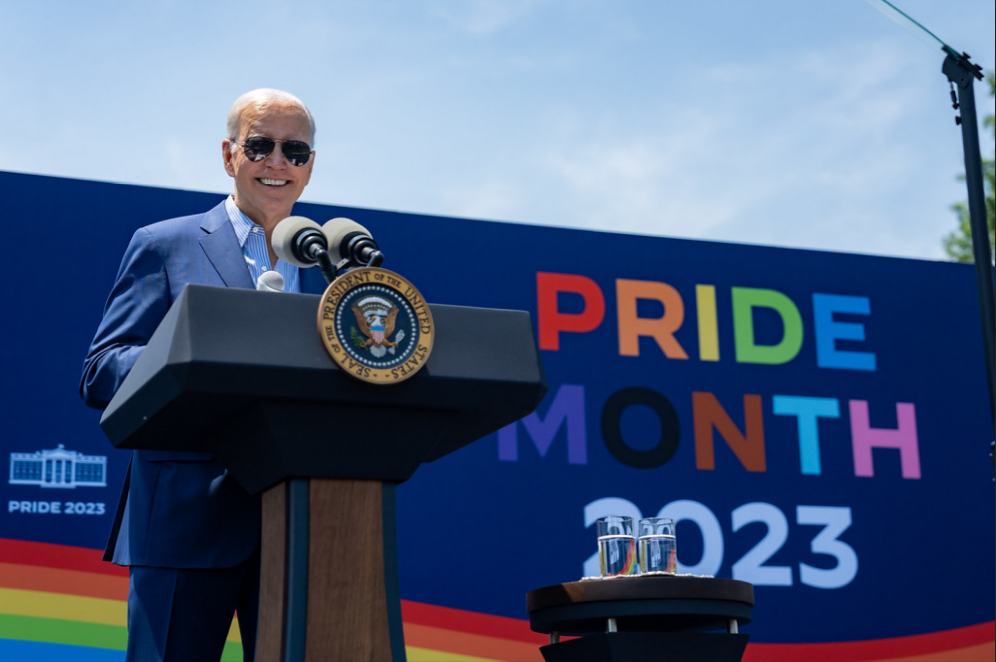
WILMINGTON, Del. — The Biden-Harris campaign on Wednesday debuted “Out for Biden-Harris,” which is a “national organizing and engagement program to mobilize LGBTQ+ voters, communities, and leaders across the country.”
Out for Biden-Harris “will train supporters to organize within their own networks and leverage messengers from the community to ensure we are meeting LGBTQ+ voters where they are,” the campaign wrote in a press release announcement.
“From drag queens to elected leaders to LGBTQ+ faith leaders, Team Biden-Harris will use a wide range of validators to communicate what’s at stake for the LGBTQ+ community in this election and why it’s critical that we vote for Joe Biden and Kamala Harris.”
The campaign also previewed some of the events and initiatives in coming weeks, which will include:
- A virtual organizing call featuring actor Wilson Cruz, Congressman Robert Garcia, HRC President Kelley Robinson, to mobilize LGBTQ+ supporters;
- A series of virtual relational organizing trainings focused on activating and reaching new volunteers targeting battleground voters. The campaign will be engaging trusted messengers, including high-profile and trusted messengers in the LGBTQ+ community, like Brita Filter, Danica Roem, Gina Ortiz Jones, and Rev.
- Hosting a series of Out For Biden-Harris house parties and community events including events in Phoenix, Arizona, Ferndale, Michigan, Milwaukee, Wisconsin, Philadelphia, Pittsburgh, and Harrisburg, Pennsylvania, and Las Vegas, Nevada to mobilize supporters.
- First Lady Jill Biden will be a featured speaker at the Human Rights Campaign Equality In Action Conference bringing together a network of 400 organizers and activists in Arlington, VA.
The campaign noted that LGBTQ voters will be “a key part” of its coalition, while 39 percent of voters consider LGBTQ equality a “make-or-break issue.”
“In 2020, nearly 11,000 LGBTQ+ volunteers mobilized to help elect President Biden and Vice President Harris,” the campaign wrote. “This year, Out for Biden-Harris will re-engage these supporters and build on their work. The program is designed around the idea that there is no better messenger to mobilize LGBTQ+ voters than their friends and neighbors to bring new supporters into our campaign.”
The Biden-Harris administration is the most pro-LGBTQ in history, and LGBTQ groups with a combined 3.8 million members have endorsed President Joe Biden’s reelection campaign.
However, “the fight for equality for all Americans is at stake this November as Trump and his allies plan to roll back the rights and freedoms of LGBTQ+ Americans,” the Biden campaign wrote. “Trump and his MAGA allies are running on an extreme, anti-LGBTQ+ agenda which would push to discriminate against the LGBTQ+ community, even going after the right to marry who you love.”
“LGBTQ+ voters are a force to be reckoned with. They were critical to our victory in 2020, and they will be critical to winning again this November,” said Biden-Harris 2024 Campaign Manager Julie Chavez Rodriguez. “That’s why we’re thrilled to launch Out for Biden-Harris, which will harness the LGBTQ+ community’s organizing prowess to reelect President Biden and Vice President Harris this November.”
Chavez Rodriguez continued, “LGBTQ+ Americans couldn’t have more at stake this election: Donald Trump and his extremist allies are running to gut LGBTQ+ rights and erase history as their top priorities. LGBTQ+ Americans deserve leaders who will fight for every American’s freedom and dignity. That’s what President Biden and Vice President Harris have done throughout their time in office, and what they will do if reelected, including pressing Congress to pass the Equality Act.”
“There has never been a more critical time to protect the rights of all Americans, no matter who you love or how you identify, and Out for Biden-Harris will be critical to not just safeguarding, but strengthening the rights and voice of every single American,” she said.
California Politics
WeHo Mayor John M. Erickson discusses re-election campaign
Erickson officially announced his re-election campaign for West Hollywood City Council this week & sits down with WeHo Times
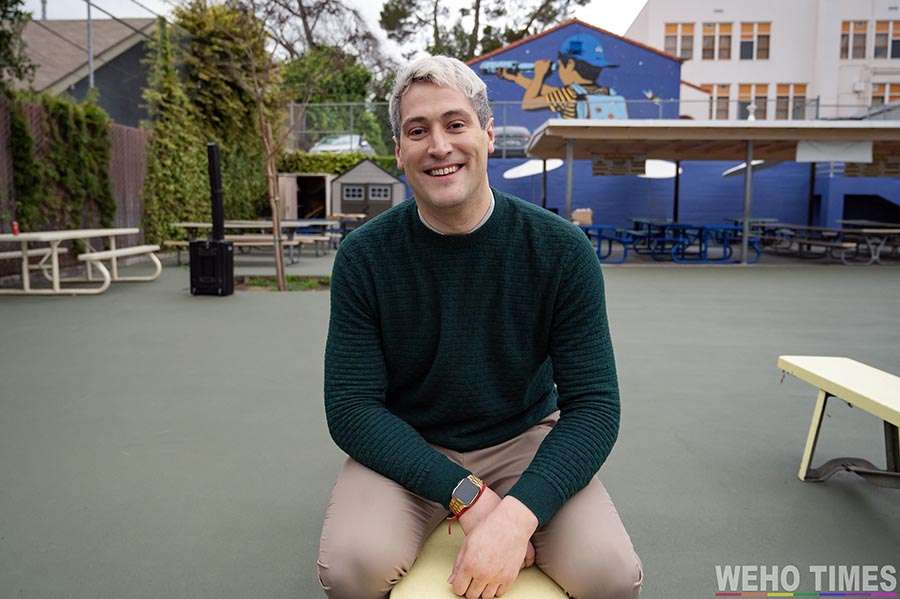
By Paulo Murillo | WEST HOLLYWOOD – West Hollywood Mayor John M. Erickson, Ph.D. officially announced his re-election campaign for West Hollywood City Council this week.
WeHo Times caught up with the incumbent following his big announcement to discuss his campaign, some of his accomplishments from his first term and the challenges he faces ahead.
===
So it’s official today. You announced your run for reelection.
Yes. I announced this morning I’m running for re-election to the West Hollywood City Council.
What is running for re-election looking like for you?
It looks like what I’ve been doing for the last four years, delivering for our residents and our businesses. When I look at the city and where I started four years ago, back then, we weren’t allowed to go outside. We were in masks, and now we are out in a vibrant, although a little gray and overcast today, sky. We have new businesses opening every day. We have residents that are further protected, thanks to some of the tenant harassment ordinances that we’ve passed. And we’re working on bringing the city into the future with new infrastructure and great new projects like the coast Playhouse and the purchasing of the Log Cabin on Robertson Boulevard. These things that are priorities to me and always have been, so the work that we’re doing continues on. My re-election ensures that the residents and businesses remain at the forefront of my mind, and I am committed to running strongly to ensure that we prioritize their needs.
Pandemic lockdown aside, how else is this campaign different from the last one?
I mean, the last time I ran, I ran a people forward campaign. It was a people centric campaign that really focused on bringing a new voice to the City of West Hollywood. And this time, it’s about holding true to those values that I ran on. I think the stuff that I’ve done over the last four years and also just the sheer logistics this time, we can go door-to-door, we can go out and see each other, and be within six feet, so making sure that the community feel we are back and are part of the campaign. That’s something I love so much.
What kind of feedback are you getting after people learned you were running for re-election?
I’ve announced it early. I’m really proud to say I am endorsed by over, I believe, 70 board members and commissioners. I’m endorsed by almost every elected official that represents West Hollywood and some are Congress member Adam Schiff, supervisor Lindsey Horvath, Senator Ben Allen, Assemblymember Rick Chavez, and my colleagues Vice Mayor Chelsea Byers and Councilmember Sepi Shine. When you look at the list, it’s a broad coalition of supporters and organizations already. I’m endorsed by Equality California, Victory Fund, The Los Angeles Building Trades Council, the Sierra Club, and the Los Angeles League of Conservation Voters. A lot of people jumped in early because they see the progress that we’ve made, and I’m really excited to see the momentum going forward.
What kind of challenges does your campaign anticipate?
I think the main topic of conversation will be what the future of the City of West Hollywood looks like, and I really welcome those conversations. I’m going to be running a positive campaign like I always did. I’m not going to be getting into the mud because I believe that residents want a positive mayor and a positive candidate out there putting forth a vision of the city that not only shows our progressive values, and our history, but also leans us towards the future in the way that we’ve been going. Is everything sunshine and rainbows? No candidate should ever say that. But we have work to do, and I’m really looking forward to that work and in those robust conversations.
What are some of the issues that are coming up for you, in this this election versus your first run?
This time it’s about building more affordable housing and housing, as a whole. We have a lot of housing to build and transportation infrastructure. We’re trying to bring the city into the 21st century when it comes to our roads and sidewalks and making sure that they’re accessible to everyone, and getting people out of cars and maybe onto bikes are another mode of transit. Walking is another great example. I think the last and most important thing that I said when I first ran was climate change. I’ve really made that a staple of my campaign, sustainability practices and climate resilience and I have that record to back it up. That’s why I’ve already received endorsements from the two leading organizations in that field. And we have a lot of work to continue to make sure West Hollywood leads on those issues. Then I think when we always invest in community safety and our businesses, you can’t go wrong there.
How is your campaign addressing public safety?
As many know, I led the charge to bring back two deputies after hearing the response from the community and making sure that our people felt safe. The first call we always get is always going to be about community safety. We need to make sure we’re responsible to that and so we’re building and pushing forward a robust public safety plan. I’m already endorsed by the firefighters and that’s really important to me, because they are our first responders. We’re building a new state-of-the-art Fire and Sheriff Station in partnership with LA County so that first responders have 21st-century tools to ensure that our diverse community is safe at home and in our neighborhoods.
So what do you tell the voter who isn’t sure about you?
I would ask them to look at my work ethic, and look at the work that I have done, and look at my response to the community. When you email City Hall, do you not get an email back? Do you not get a phone call back? What I say to the voter that’s unsure is that I’ve led the City with distinction and I’ve led the city with, I believe, the honor that I’ve always been taught by my former mentors. I’m looking forward to continuing that and making sure that the people of the City of West Hollywood know that they’re my first priority.
How will your campaign address your detractors?
There’s always going to be detractors. I would say that even my detractors would say that I answer the phone when they call. I don’t think anyone can ever say that I don’t welcome a robust conversation. I have very strong values and morals. I’m really proud of that. My grandmother taught me those things when as a young queer kid in Ripon, Wisconsin. I think the most important thing that I can say to my detractors is, you may not like what I’ve done, or you may not like what we’re trying to do as a city, but I want you to come and talk to me and give it a chance. If after that, you still don’t want to be involved in the conversation, you can always call me if something’s happening because I’m there for you just as I’m there for everyone else.
What do you love most about being Mayor and council member of the City of West Hollywood?
The best part about being the mayor and the council member in the City of West Hollywood is you get to see and interact with people on a person-to-person basis in a way that we all work together for a better future for our city. When the principal of West Hollywood Elementary School can call the mayor directly and not have to go through staff, when a resident can call, or a parent at a school can call the Mayor of West Hollywood and say they’re having this issue, or need more green space, or they want to have pickleball courts in the city… my answer is going to be yes, because that’s the role of our local government. Local is where community happens. And I’m so proud of that. This is why I post my Plummer Park event for the last 34 months now without missing a single one. The community needs to know that we’re out at a school, or we’re out in the streets, or their businesses. The mayor is listening and I think that’s the best part of being here, we get to hear right from the community.
===
For a full list of endorsements, biography, issues, and more visit www.erickson4weho.org and follow John on social media @JohnEricksonWH.
To read about John’s accomplishments in his first term, go to: https://erickson4weho.com/
**************************************************************
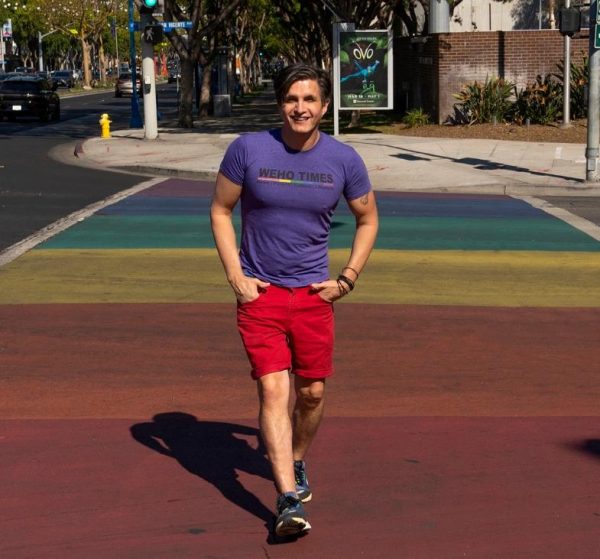
Paulo Murillo is Editor in Chief and Publisher of WEHO TIMES. He brings over 20 years of experience as a columnist, reporter, and photo journalist.
******************************
The preceding article was previously published by WeHo Times and is republished with permission.
California Politics
Raul Ureña battles recall election in Calexico over his trans identity
For Ureña, the recall is more than a political hurdle; it is a litmus test for the values of the community he serves
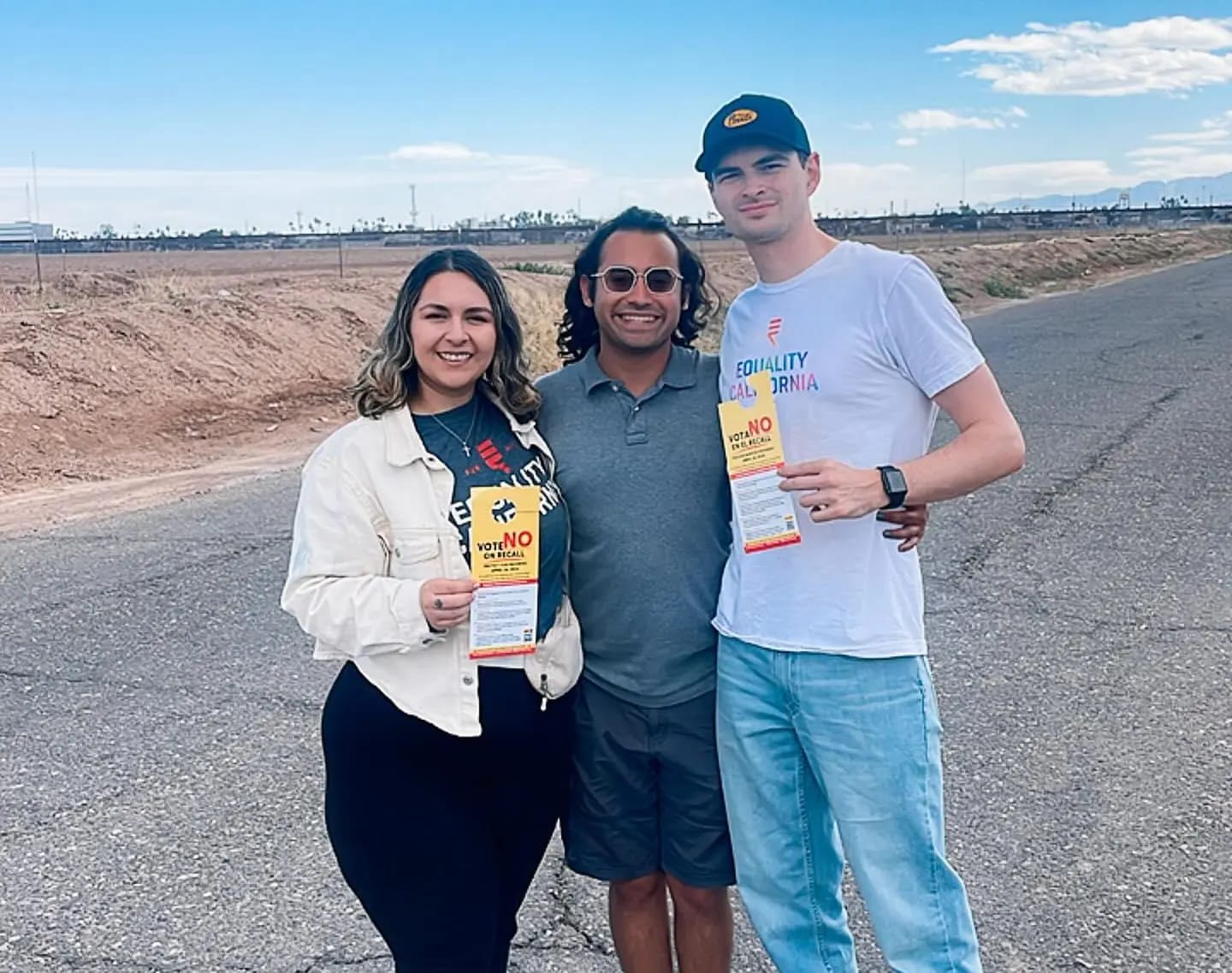
CALEXICO, Calif. – A battle is underway that encapsulates the broader national struggle over LGBTQ+ rights, environmental policy, and the future direction of local governance. At the center of this storm is Raul Ureña, 26, one of the youngest and first openly transgender city council members in Calexico’s history.
Ureña faces a recall election orchestrated by a faction of past politicians and fueled by a campaign marred with alleged misinformation and accusations rooted in prejudice.
Ureña, alongside fellow young councilmember Gilberto Manzanarez, has been instrumental in ushering in a new era of progressive policy-making in Calexico, aimed at rectifying a decade of economic downturn, political strife, and social neglect. Their tenure has been marked by significant investments in the community’s infrastructure, environmental initiatives, public safety, and efforts to boost the financial health of the city, in stark contrast to the practices of previous administrations.
The Recall Effort: A Closer Look
The recall, set against the backdrop of Calexico’s 116th anniversary, emerges as a politically motivated attempt to derail the momentum gained by Ureña and his colleagues. Ureña provided insights into the recall’s dynamics: “Right now it is April 5, we are 11 days from the recall election that was petitioned by a group of very hateful citizens,” Ureña told The Bolade. “They have raised north of $30,000, which is a substantial amount for our small city, mainly to circulate petitions for the recall.”
Despite the financial and political onslaught, Ureña remains undeterred, highlighting the backing from organizations like the United Auto Workers, a testament to his environmental advocacy and progressive policies, including the introduction of the county’s fastest and only electric vehicle chargers.
The Impact of Ureña’s Policies
Under Ureña’s stewardship, Calexico has witnessed tangible progress across several domains:
- Financial Health: Addressing the city’s financial mismanagement has been a priority, with corrective measures now steering Calexico away from a state-designated “High Risk” status due to previous overspending and budgetary inaccuracies.
- Transportation and Infrastructure: Ureña’s role as the city’s commissioner at the Imperial County Transportation Commission has been pivotal in securing funding and advancing projects like the $13.4 million Intermodal Transportation Center, set to enhance regional mobility and address border traffic issues.
- Environmental Advocacy: A staunch environmentalist, Ureña has championed the New River Improvement Project, aiming to remediate one of the nation’s most polluted rivers, alongside initiating the city’s first micro-transit system, which has become the county’s most successful transit service.
- Community and Public Safety: Investments in emergency services, the rehabilitation of essential facilities like Fire Station #2, and improvements in parks and recreation underscore the commitment to public welfare and community engagement.
- Pro–Worker Policies: Ureña and Manzanarez have implemented pro-worker policies as part of their economic development strategy in Calexico, focusing on the well-being of the working population. They spearheaded an equitable spending plan for the American Relief Plan Act (ARPA), allocating 1 million dollars in “hero pay” to essential workers who served during the COVID-19 pandemic, recognizing their contributions as equally valuable to those of other city employees who received similar compensations in the past.
Facing Down Hate and Misinformation
Addressing the recall campaign’s undertones, Ureña stated, “The claims against me for the recall are just dog whistles for transphobia.”
He remains committed to his agenda, asserting that he takes the right’s labeling his party as “radicals” as a complimentary testament to their dedication. “We have our goals and strong ideas. we said we were going to clean up the new river and that project is under construction. The electric vehicle chargers are under construction. We are building the largest transportation center in the imperial county. We are building affordable housing. We are radical, because when we say we are going to do something, we go ahead, and we do it. No excuses.”
Equality California (EQCA) has thrown its support behind Ureña.
“Ureña is one of only a handful of out transgender elected officials in California and, at a time when trans Californians are facing unprecedented political attacks, trans representation in elected office is more important than ever,” said EQCA Executive Director, Tony Hoang.
The Future of Calexico
As the recall election looms, the stakes for Calexico and for Ureña could not be higher. A city at a crossroads, Calexico’s voters face a choice between continuing on a path of progressive reform and environmental stewardship or reverting to the governance that precipitated years of decline.
For Ureña, the recall is more than a political hurdle; it is a litmus test for the values of the community he serves, the efficacy of his policies, and the resilience of progress against the tide of misinformation and intolerance.
Politics
Melania Trump to host Log Cabin Republicans event
Funds will be used to support the group’s “Road to Victory” program, which will target voters in swing state

PALM BEACH, Fla. — Former first lady Melania Trump is back on the campaign trail with plans to host a fundraising event for the conservative LGBT group Log Cabin Republicans on April 20 at Mar-a-Lago, Politico reported on Thursday.
Funds will be used to support the group’s “Road to Victory” program, which will target voters in swing states. LCR has had a close relationship with Mrs. Trump, who was a special guest for its Spirit of Lincoln Gala in 2021, where she received the Spirit of Lincoln Award.
Politico reports that the host committee for this month’s event will include GOP donors Saul Fox, Amanda Schumacher, Bill White, Bryan Eure and Richard Grenell, who is gay and served as ambassador to Germany and acting director of national intelligence during the Trump administration.
“Melania Trump’s work as first lady, from helping children reach their full potential to championing a more inclusive Republican Party, has been historic,” LCR President Charles Moran said in a 2021 press release concerning the Spirit of Lincoln event.
“Her vocal support of Log Cabin Republicans has been a signal to Republicans everywhere that it is possible to simultaneously be conservative and support equality under the law for all Americans,” he said.
Related:
LCR Statement on Biden-Harris collision of Easter & Trans Visibility Day pic.twitter.com/5xzfyApHTB
— Log Cabin Republicans (@LogCabinGOP) April 1, 2024
-

 West Hollywood4 days ago
West Hollywood4 days agoDavid Cooley makes emotional exit as owner of The Abbey WeHo
-

 Politics4 days ago
Politics4 days agoFirst Lady warns Trump is ‘dangerous to the LGBTQ community’
-

 Los Angeles5 days ago
Los Angeles5 days ago24-year-old trans Latina Angeleno & makeup artist shot to death
-

 Political commentary & analysis4 days ago
Political commentary & analysis4 days agoJimmy Kimmel Live’s hilarious faux ‘Out for Biden’ campaign ad
-

 West Hollywood2 days ago
West Hollywood2 days agoOut stylist found beaten outside Heart WeHo nightclub recovering
-

 Political commentary & analysis1 day ago
Political commentary & analysis1 day agoThe Cass Review heralds how all trans medicine will die
-

 Colorado4 days ago
Colorado4 days agoTransgender, nonbinary ICE detainees allege mistreatment at Colo. detention center
-

 Events5 days ago
Events5 days agoCynthia Erivo to be honored at LA LGBT Center Gala
-

 Los Angeles County5 days ago
Los Angeles County5 days agoCity of Malibu backing two bills aimed at making PCH safer
-

 West Hollywood3 days ago
West Hollywood3 days agoVinson is leading riders in 2024 WeHo Pride & Dyke march












